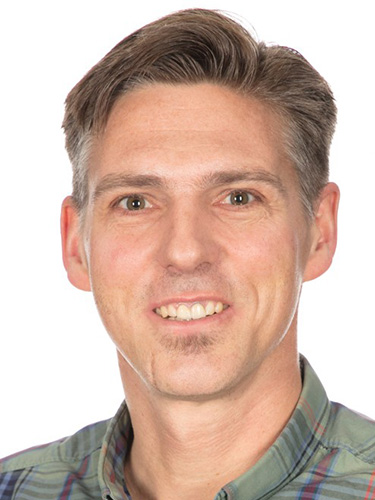“Being lazy is also in our genes”
Sweat in the gym or watch a TV series instead? Some people win the battle against their "inner couch potato" more easily than others. Exercise scientist Markus Gerber explains what the brain has to do with it and what role genes play in this process.
18 February 2025 | Noëmi Kern
Mr Gerber, how do you motivate yourself to be physically active?
Actually, I can’t get enough exercise. I like various kinds of exercise and have played tennis for a long time. I enjoy skating in winter, and I’m an enthusiastic skier. Strength training and endurance sports like swimming are also part of my life. And I ride my e-bike to work every day, 27 kilometers each way. So a basic level of activity in my life is actually guaranteed.
Why do many people find it so difficult to get themselves moving?
There are various factors that lead to that. For some people, it’s that their social environment is not supportive; for others, it’s that they don’t have time for physical activity because they work so much. The main thing is, if you’re not yet in the habit of doing an activity, then how you feel on the day plays a critical role. For instance, if you’ve had a stressful day, the energy you have available for self-regulation will already be low or even completely depleted, so it’s going to be especially difficult to get yourself moving. In our Physical Activity Counseling Center at the Department of Sport, Exercise and Health (DSBG), we work with participants individually to find out where their sticking points are, in order to look for solutions that are specific to them.
External circumstances are one thing. Why do some people enjoy exercise more than others?
As children, all humans have the urge to move; you have to physically move around in order to explore the world. So the usefulness and the meaning of movement are obvious. But socialization also plays an important role in exercise habits in childhood: how do the parents behave, as role models? How much physical activity do they do with their children in their free time, and do they encourage extracurricular sports? A child’s friends and how school-based physical education are organized also have an influence. Up to a point, a person’s genes are also responsible for how physically active they are.
So our genes influence how much we enjoy exercise?
There aren’t many studies on this yet, but those that do exist show that the genetic component of exercise habits is between 30 and 70 percent. So we have to be really careful about apportioning blame with statements like: “That’s unhealthy behavior, you don’t have any self-discipline.”
That’s handy! Then can we just blame our genes if we choose the sofa over a jog?
It’s tempting, of course. But genes don’t influence us 100 percent. We’ve still got the option of intervening. Interestingly, the genetic component has more of an effect in adulthood than in childhood. That’s because the influence of the parental home decreases.
How does physical activity change over the course of a person’s life?
Physical activity always has an ultimate goal, and that won’t be the same in every phase of life. Children up to 12 years old typically love to move around, as a rule.
After that, during puberty, the body needs a lot of energy for other developmental processes. In other words, human nature actually dictates that the motivation to exercise is a little lower at that age. Another disruption is parental leave. I think you’ve just got to accept that to a certain degree and say: “Don’t worry about it. You’ll get more active again later on.” Older people are still very happy to be active for a very long time.
What role does your mind play when it comes to physical activity?
The brain decides, consciously or unconsciously, what to do. Cognitive functions are a major factor in exercise habits. The fact that automatic processes have an influence on the control of exercise has long been ignored in psychology.
It was assumed that the only thing controlling our behavior were our cognitions, how we think about physical activity and how strong our intention is. But now, there is increasing interest in things that happen subconsciously in our brains. There are attempts to find out whether how someone perceives exercise on an affective level – that is, on a subconscious level – makes a difference to their exercise habits. Our review article on the psycho-physiological basis of physical activity is concerned with showing how previous research has been conducted and how the various approaches could be interconnected (see box below). Progress is being made at the intersections between different scientific disciplines such as exercise psychology, neuroscience, evolutionary science), and I think we ought to make much better use of this potential in exercise-related motivational psychology.
What does that mean in concrete terms?
We can, for example, use cognitive training programs that don’t have much to do with exercise to improve the self-regulatory resources that underlie our exercise habits. And from an evolutionary perspective we should focus more on the “why.”
Why should a person exercise at all? How much can exercise contribute to making a person’s life more worth living? If I look for an activity that suits me, then I’ll exercise not just for the sake of exercise, but because it truly adds something to my life. Pushing the idea that “You must be active in order to be healthy” or that “Exercise is medicine” is a novel phenomenon, and really abstract as a concept.
… But it’s scientifically proven: a host of studies show that physical activity is good for your health and can lengthen your lifespan. Isn’t that enough of a motivation?
The question to ask is whether longevity is a meaningful life goal. I think it’s more appropriate to ask yourself what makes you happy in your life. To say, as an individual, “I’m doing sport now because I want to live to 90,” is not the approach to take, in my view. You should be saying: “I’m doing sport because I enjoy it and because it makes my life more worth living. And if I’m lucky, I’ll also live to 90 because of it.”
So it’s about intrinsic motivation?
From an evolutionary perspective, the ultimate goal of physical activity was never to promote our health; it was for gathering food, for learning, and for acquiring certain skills. It was also entirely appropriate to be inactive at times. Once you’d caught your quarry, you’d want to budget your energy so that you wouldn’t need to go hunting again the very next day. That’s why being lazy is also in our genes. However, due to technological progress our modern societies have become more sedentary, so we now have to think how else we can be physically active.
What’s your advice?
It’s all about taking down barriers to exercise, instead of focusing on health targets. You should look for a form of exercise that suits you, and keep looking until you’ve found that activity. As soon as you realize that an activity doesn’t suit you, you should pull the emergency brake. If I’m only playing tennis because it’s there on the calendar, and not because I enjoy it, then I don’t see the sense in it. Exercise should ultimately be meaningful, even if it’s sometimes a pain and not always fun at first.
Review on the current state of research
The review article Psycho-physiological foundations of human physical activity behavior and motivation: Theories, systems, mechanisms, evolution, and genetics provides an overview of existing findings on why and when people are motivated to be physically active. Evolutionary, genetic, psychological, and environmental factors all play a role in this context. The study therefore highlights the necessity of an interdisciplinary approach and new theoretical frameworks to effectively promote active lifestyles. The systematic review was published in January 2025 in the journal Physiological Reviews.




